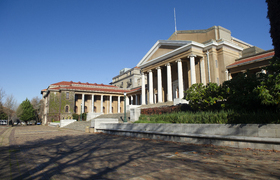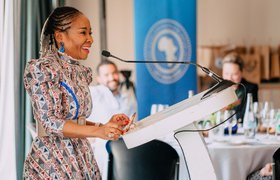ASSAf and SAYAS recognise UCT academics’ research excellence
18 December 2023 | Story Ayanda Mthethwa. Photo iStock. Read time 10 min.
Ten University of Cape Town (UCT) researchers have been inducted as members of the Academy of Science of South Africa (ASSAf). Concurrently, the South African Young Academy of Science (SAYAS) admitted one researcher from UCT.
Induction to ASSAf is a tremendous honour bestowed upon the country’s most excellent and internationally renowned researchers in recognition of their scholarly and scientific achievements in the service of society.
At the annual awards ceremony held on 9 November, ASSAf named professors Hans Beushausen, Vimal Ranchhod, Marcello Vichi, Amanda Weltman, Digby Warner, Karen Sliwa-Hahnle, Liesl Zühlke, Hanri Mostert, Alison September and David Buckley among the 38 new scholars inaugurated. Meanwhile, SAYAS inaugurated Professor Jessica Auerbach Jahajeeah as one of its 10 new members.
SAYAS members are young scientists below the age of 40 with PhDs, who are regarded as excellent in their fields of expertise. They hail from all disciplines, including pure and applied sciences, humanities, social sciences, and the arts.
Professor Hans Beushausen, Department of Civil Engineering
Since 2020, Professor Beushausen has been the director of UCT’s Concrete Materials and Structural Integrity Research Unit. The entity is the only one of its kind in the Southern Hemisphere and is broadly considered the leading concrete research unit in Africa. His extensive work on condition assessment and repair of concrete structures has found significant application in engineering practice. The Durability Index approach – a method used to test the hardness of material and its resistance to breaking down, which Beushausen helped to refine for widespread industry application – is considered state-of-the-art among worldwide performance-based methods for specification and quality control of concrete structures.
Professor Vimal Ranchhod, School of Economics
Professor Ranchhod has had an exceptional academic career to date, which is reflected in his promotion to full professor at age 41. He is currently a professor in the School of Economics, the deputy director of the Southern Africa Labour and Development Unit (SALDRU), and the head of the South African node of the African Centre of Excellence for Inequality Research. His research interests include labour economics, poverty and inequality, education, and discrimination. Ranchhod’s body of work is deeply rooted in policy making. Most recently, he was part of a SALDRU team that substantially contributed to the design of South Africa’s COVID-19 social relief measures at the onset of the pandemic. His other policy-related work on the South African labour market includes evaluating the effects of minimum wages on domestic workers and estimating the effects of agricultural minimum wages on rural poverty in the country.
Professor Marcello Vichi, Department of Oceanography
With a background in oceanography, climate science and marine ecology, Professor Vichi has 25 years’ experience in the numerical modelling of the ocean and the climate system. He is an interdisciplinary scientist who collaborates with biologists, physicists, engineers and social scientists to investigate the multiple facets of the ocean sciences. Vichi has also contributed to training more than 40 postgraduate students in this field in less than nine years, including the first generation of black African sea-ice glaciologists in the world. He has played a crucial role in establishing the South African Polar Research Infrastructure, a long-term investment funded by the Department of Science and Innovation.
Professor Amanda Weltman, Department of Mathematics and Applied Mathematics
Professor Weltman holds the South African Research Chair (SARChI) in Physical Cosmology. She is also the founder and director of the High Energy Physics, Cosmology & Astrophysics Theory group, the only group of its kind in the country bridging high energy theory and astrophysical observations. With this group, she has created an environment in which people thrive along with the advancement of science and knowledge. Weltman’s research interests include theoretical physics, from string theory through cosmology and astrophysics. She has also made contributions to phenomenology, experimental design and analysis, and more recently, radio cosmology. She is currently playing a leading role in the HIRAX experiment – an international project that is led by South Africa, with the aim of building a radio telescope array with the goal of understanding fast radio bursts and the Dark Universe.
Professor Digby Warner, Department of Pathology
Professor Warner is from the division of Medical Microbiology and a full member of UCT’s Institute of Infectious Disease and Molecular Medicine (IDM). From January 2024, he will assume the role of director of the IDM. His research focuses on fundamental aspects of Mycobacterium tuberculosis (TB) metabolism and the intersection of host, environmental, and mycobacterial factors driving TB transmission. He is interested in advanced microscopy and its use in infectious disease research and in making imaging technologies accessible to other researchers in low-resource settings. A notable example is his involvement in the Africa Microscopy Initiative, which aims to increase the awareness and utilisation of bioimaging across the continent. He also serves as the co-founding director of Eh!woza, a community engagement platform focusing on TB and its social impacts in high-burden communities.
Professor Karen Sliwa-Hahnle, Department of Medicine
Professor Sliwa-Hahnle is the director of the Cape Heart Institute, a translational cardiovascular research institute with eight distinct research groups. She is on a joint appointment as a senior cardiologist at UCT’s Division of Cardiology, Department of Medicine, the UCT Private Academic Hospital and Groote Schuur Hospital. Her areas of expertise are heart failure, structural heart diseases such as cardiomyopathy and cardiac disease in pregnancy. She has led several inter-Africa and global research projects with a significant impact on creating knowledge about cardiovascular diseases that are common in Africa and other middle- to lower-income regions, leading to changes in policy. She has authored more than 450 publications and trained more than 35 postgraduate students.
Professor Liesl Zühlke, Department of Medicine
Professor Zühlke is a paediatric cardiologist in the Department of Paediatrics, the director of the Children’s Heart Disease Research Unit and the vice-president (Extramural Research and Internal Portfolio) of the South African Medical Research Council (SAMRC). Her focus areas include family-centred research into childhood-onset heart diseases of relevance in Africa, with particular interest in rheumatic and congenital heart disease. She currently leads, among others, the Partnerships for Children with Heart Disease in Africa (PROTEA) study, which aims to describe the epidemiology and genetic origins of congenital heart disease in several African countries. She has over 180 publications and book chapters and has been cited over 56 000 times. Besides her work in equity, global health and advocacy, Zühlke is an active and vociferous advocate for the advancement and empowerment of women in medicine and cardiology.
Professor Hanri Mostert, Department of Private Law
Professor Mostert has studied property, land and mineral law for over 20 years. During her years as a scholar of the German Academic Exchange Service at the Max Planck Institute for Public and International Law and later as a Humboldt fellow at the University of Freiburg, Mostert researched constitutional and public law aspects of property. From this arose a doctoral dissertation on constitutional property protection and a monograph on mineral law that was cited with approval by the Supreme Court of Appeal and relied on by the South African Constitutional Court. In her current role as SARChI Research Chair for Mineral Law in Africa at UCT, she studies the mineral laws of Africa. She intends to expand the network of highly specialised mineral law experts on the continent.
Professor Alison September, Department of Human Biology
A geneticist and academic leader, Professor September has made significant contributions to the study of genetics. She owes her academic success partly to receiving the Lord and Lady Sainsbury Scholarship for PhD studies, which allowed her to complete one year at the University of Oxford. She has dedicated her career to advancing the understanding of genetics, particularly in the context of musculoskeletal injuries. One of September’s most notable contributions is her role as a co-leader of the international GOINg consortium – an initiative focused on exploring the genetics of musculoskeletal injuries. She actively mentors and trains academics in Africa by helping them obtain their PhDs and encouraging them to lead research programmes in previously disadvantaged institutions. Her most recent achievement is the prestigious SAMRC mid-career award in 2023.
Professor David Buckley, Department of Astronomy
Professor Buckley is the principal investigator on the Southern African Large Telescope (SALT) transient follow-up programme. His research focuses on multi-wavelength studies of compact binary stars. After completing a PhD at the Australian National University, he began his career as a postdoctoral fellow at UCT in 1988. He then moved to the South African Astronomical Observatory in 1991 as a staff astronomer. He was a project scientist for SALT and the first SALT astronomy operations manager and science director. Buckley has a long-standing relationship with UCT, including as a lecturer within the National Astrophysics and Space Science Programme and co-supervisor of graduate students. He was appointed a UCT Honorary Research Associate in 2022. He is also an affiliate professor at the University of the Free State.
Professor Jessica Auerbach Jahajeeah, Graduate School of Business
Auerbach Jahajeeah is an anthropologist and associate professor at the UCT Graduate School of Business (UCT GSB). At the UCT GSB, she directs the MPhil in Inclusive Innovation and teaches ethnography, qualitative research methods and thinking in Africa. She recently set up the Light Lab at the UCT GSB as an interdisciplinary space to explore knowledge infrastructure and knowledge politics. Auerbach Jahajeeah is working on a book on African fibre optic connectivity. She is a P-rated researcher with the National Research Foundation and an Iso Lomso fellow at the Stellenbosch Institute of Advanced Study.
 This work is licensed under a Creative Commons Attribution-NoDerivatives 4.0 International License.
This work is licensed under a Creative Commons Attribution-NoDerivatives 4.0 International License.
Please view the republishing articles page for more information.










